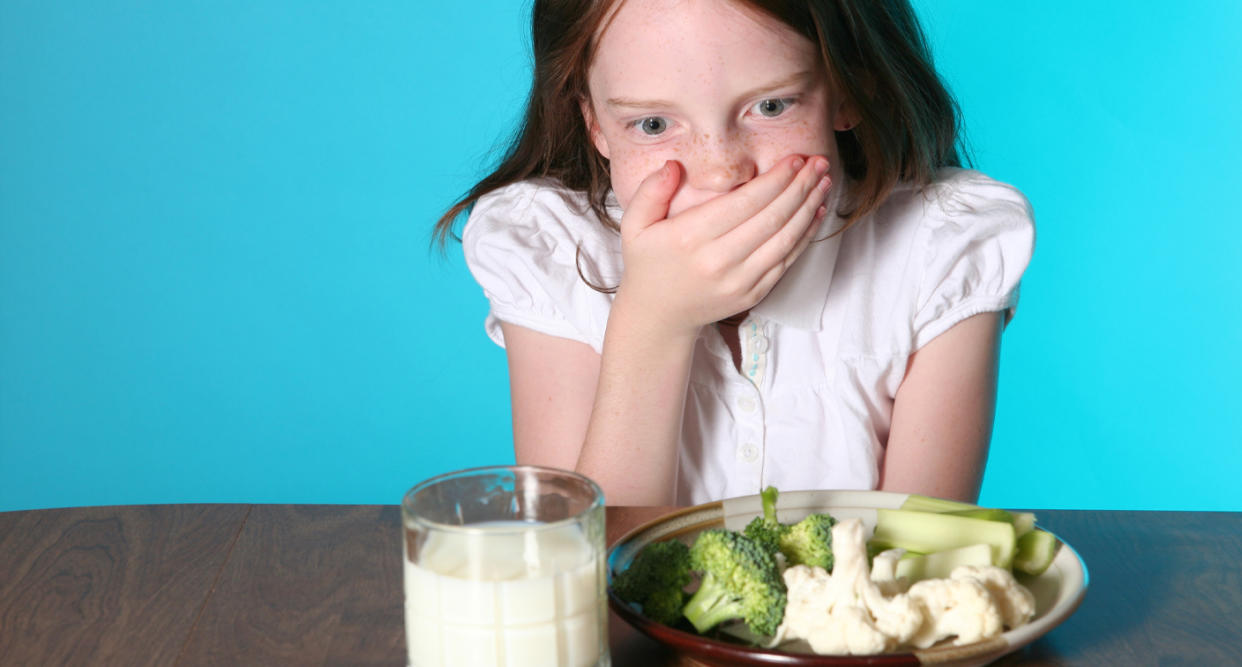Genetics may be the reason why you hate vegetables, study shows

Can’t stand the taste of vegetables? Your genes may be to blame.
Preliminary new research presented at the American Heart Association (AHA) Scientific Sessions shows that a specific gene makes certain foods — especially, broccoli, cauliflower, cabbage, and Brussels sprouts — taste extremely bitter to some people.
The gene in question is called TAS2R38. Everyone inherits two copies of this taste gene, but which variant of the gene you get makes all of the difference. According to the AHA: “People who inherit two copies of the variant called AVI aren’t sensitive to bitter tastes from certain chemicals. Those with one copy of AVI and another called PAV perceive bitter tastes of these chemicals; however, individuals with two copies of PAV, often called ‘super-tasters,’ find the same foods exceptionally bitter.”
In the study, researchers analyzed questionnaires from 175 men and women about how often they ate certain foods and found that those with the PAV form of the gene — who are more sensitive to bitter tasting foods — were more than two and a half times as likely to eat the least amount of vegetables.
For super-tasters, the bitterness they taste in vegetables goes beyond being mildly annoying. “A super-taster is a person who experiences a bitter taste with a much greater intensity than others,” Tina Sindher, MD, an allergist and immunologist with Stanford Health Care, tells Yahoo Lifestyle, noting that super-tasters have many more visible taste papillae (bumps on the tongue’s surface) with more taste receptor cells compared to others.
Or as the lead author of the study, Jennifer L. Smith, PhD, RN, put it to the AHA: “We’re talking a ruin-your-day level of bitter when they tasted the test compound.”
Super-tasters have the hardest time eating brassica vegetables — broccoli, cauliflower, Brussels sprouts, cabbage, turnips, collards, kale, bok choy — along with spinach, coffee, and tart citrus flavors. “Studies show that bitter tasters eat fewer soy products and drink less green tea, and rated these foods to be more bitter than non-tasters,” says Sindher.
That bitterness is getting in the way of super-tasters eating their vegetables, which may mean losing out on some health benefits. An overall healthy diet that’s rich in vegetables and fruits may reduce the risk of heart disease, including heart attack and stroke, according to the U.S. Department of Agriculture. Vegetables are also a good source of dietary fiber, which helps reduce blood cholesterol levels and may lower risk of heart disease.
And in case you were wondering, just because you hate cilantro doesn’t mean you’re a super-taster. Disgust with that particular herb, which some find smells like soap, is a combination of two genetic variants (one of which is tied to sensing odors), according to Nature. Cilantro’s aroma is created by several substances, which include fragments of fat molecules called aldehydes — the same (or similar) aldehydes you’ll find in soap and lotions, according to a New York Times report.
“Super-tasters are individuals who are sensitive to specific bitter compounds, none of which are found in cilantro,” explains Sindher. “In fact, an aversion to cilantro occurs due to genetic variants associated with sensing smells and sensitivity to the aldehyde chemicals that give cilantro its distinctive flavor.”
But for true super-tasters, how can they make sure to eat their vegetables? Unfortunately, there’s no obvious way to disguise the bitter taste, explains Sindher. “However, some strategies may be to sprinkle some sweetness to help mask bitter flavors,” she says. “Spices can help enhance flavor. Adding a little fat can also decrease bitterness.”
Read more from Yahoo Lifestyle:
Heavy weed use linked to higher risk of stroke in young people, says new study
Is too much screen time affecting young kids’ brain development? Here’s what parents should know
Follow us on Instagram, Facebook and Twitter for nonstop inspiration delivered fresh to your feed, every day.

